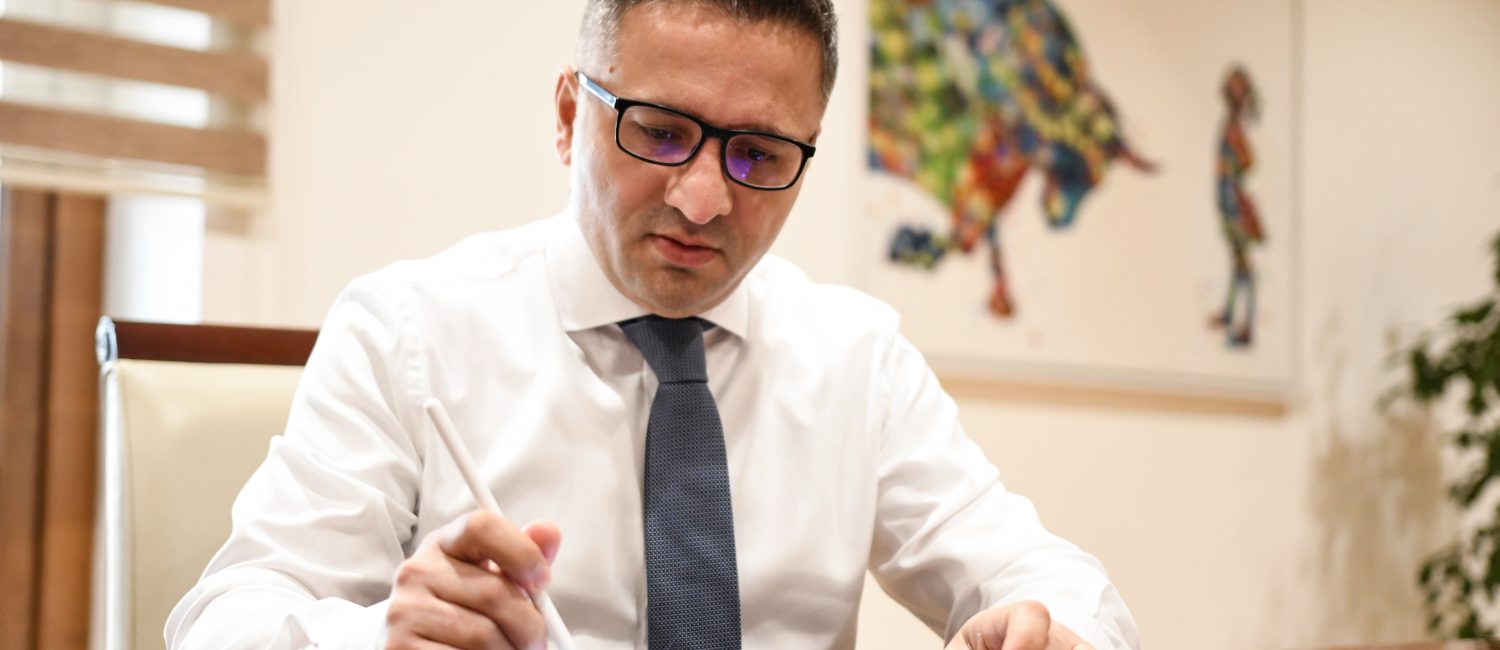21st October 2023, Skopje – October is a month when top officials of international financial institutions, Ministers of Finance and Development, Governors of Central Banks, university professors, Think Tanks and NGOs from all over the world gather in one place at the Annual Meetings of the International Monetary Fund and the World Bank Group. Interesting fact: around 10,000 delegates take part in the Annual Meetings. During the past 74 years, the Meetings represent a platform to discuss global economic trends, development policies, financial stability, international cooperation and achieving sustainable economic growth. During the Annual Meetings, new cooperation programs and projects with the IFIs are arranged. They are also an opportunity for the government representatives to meet investors from all around the world.
Delegation, led by me and the Governor of the National Bank participated in this year’s Annual Meetings, which took place in Morocco. During the meetings held with the World Bank, we discussed the new five-year Country Partnership Framework, which is to be finalized by the end of this year, with the World Bank supporting sustainable and green growth projects in the country. With the IMF, we discussed macroeconomic developments and the Precautionary and Liquidity Line in the amount of half a billion euros, which the Fund approved as a result of the country’s sound economic fundamentals and policies. We also had exceptionally significant meeting with the First Vice President of the European Bank for Reconstruction and Development, which have supported projects in the amount of EUR 2.55 billion since the country’s independence. The objective is to finance new investment projects in areas of priority for the Macedonian economy. All in all, the meetings were very productive for our country, providing financial and technical support for further implementation of the reform process and strengthening the growth potential.
Slowdown of Global Growth, Developing Economies at Risk
Support the Bretton Woods Institutions extend is especially important for the developing economies in times of multiple global crises, overlapping and bringing uncertainty to the growth prospects. Indeed, global economy proved surprisingly resilient in the past three years, however, recovery was slow and unequal. Actually, global growth today is below the average in the past two decades before the pandemic, while medium-term projections hit the lowest level in the past few decades. According to the IMF’s April baseline forecast, presented in the World Economic Outlook, global growth will slow down to 3% in 2023 (compared to 2022, when it was 3.5%) and 2.9% in 2024, well below the historical (2000 – 2019) average of 3.8%. Advanced economies are expected to slow from 2.6% in 2022 to 1.5% in 2023 and 1.4% in 2024 as policy tightening starts to bite. Emerging market and developing economies are projected to have a modest decline in growth from 4.1% in 2022 to 4.0% in both 2023 and 2024.
Considering the level of development and the economic capacity, developing economies are at considerable risk. Differences between developed economies and regions in the past years intensified even more, also fueled by the geo-economic fragmentation and the climate changes. Over the past two decades, developing economies have recorded growth of 6%, while the expectations are that average growth will slow down to 4% over the next 7 years. With each lost percent, around 100 million people worldwide are pulled into poverty, and another 50 million people are pushed into extreme poverty. Globally coordinated decisive action is to be undertaken now to address this.
International financial institutions, the purpose of the establishment of which was to provide a coordinated response in times of crisis, preserve the stability of the global economy and support the economies’ development, will certainly have the leading role, together with the economic policy makers, in coming up against and coping with the challenges the world faces.
Bretton Woods History
The idea to establish Bretton Woods Institutions, i.e. the International Monetary Fund, the World Bank and the General Agreement on Tariffs and Trade (the predecessor of the World Trade Organization) originated in 1944 during the Bretton Woods Conference, at which representatives of 44 countries gathered to discuss the world economy and the international monetary system following the World War II, i.e. to create a framework of international cooperation in the post-war world and to maintain monetary stability. During the Conference, the American delegation proposed to establish an international currency exchange regime, with each country contributing thereto and borrowing to resolve short-term BOP deficits. The proposal was accepted and the establishment of the IMF was the outcome. At the Conference, Articles of Agreement of the International Monetary Fund were signed, as basis for the post-war international monetary system, while the IMF came into formal existence in 1945. Decision on establishment of the International Bank for Reconstruction and Development, now known as the World Bank, was also adopted, the primary mission of which was to provide financial and technical assistance for reconstruction and development of economies affected and destroyed during the World War II. In fact, the objective of the Bretton Woods System was to maintain full employment, stable prices and global trade balance.
In order to maintain the good practice of a coordinated response to global challenges, the first Annual Meetings of the IMF and the World Bank and its affiliates, the International Development Association (IDA) and the International Finance Corporation (IFC), were held in 1947, to reunite the member countries to further discuss poverty reduction strategies, economic development and infrastructure projects. Since then, Annual Meetings are regularly convened. Over the years, the scope and the focus of the Meetings changed depending on the changes in the global eco-system, but the main objective has remained the same – support and encourage international cooperation, economic stability and sustainable growth.
“World Free of Poverty on a Livable Planet”
Messages communicated by the top officials of both the World Bank and the International Monetary Fund during the Annual Meetings indicate the urgency of the matter and the need of more consolidated global strategies, to yield faster and better results. As World Bank President, Ajay Banga, said – the Bank has a new vision and mission – “to create a world free of poverty on a livable planet”, according to a new playbook that will drive “a meaningful development leading to better quality of life – access to clean air, clean water, education and decent health care”. It is a mission that is inclusive of everyone, including especially women and young people, which potential on the labour market is underutilized. It is crucial to strengthen the resilience to shocks, including against climate changes, pandemics and fragility, since crisis situations, as we have seen in the past three years, are no longer incidental, but they rather become a new global surrounding in which the economies operate.
New WB’s global strategy involves strengthening both the financial support and the technical assistance to development projects, which will provide for a sustainable and green growth by merging capital and portfolio guarantees with a multiplying effect, i.e. every new US$ 1 will drive an additional US$ 6 to 8. President of the World Bank has also announced that they are exploring, with other multilateral development banks, ways to better utilize capital and SDRs, thus unlocking funding for the existing and the new funds for the Bank’s development goals.
Similar messages, aimed at enhancing the economies’ resilience and liquidity support in times of tightened financial conditions, through various financial instruments, have been delivered by the IMF Managing Director, Kristalina Georgieva, pointing out that serious measures are to be undertaken so as to write a new and better story for the next fifty years. In an eco-system with weak medium-term growth prospects, the right policies and reforms are essential, such as maintaining price stability and safeguarding financial stability, as well as fiscal sustainability. Importance of fiscal consolidation is of major importance therefore, a fiscal sustainability policy our Government is committed to. In fact, we implement several policies to narrow down the financing needs and strengthen the fiscal room, among which are the fight against informal economy, implementation of tax reforms aimed at improving the tax collection, saving, as well as other ways to mobilize capital. It is worth noting the IMF research which shows that tax reforms alone could add up to 5 percent of GDP in revenue for emerging markets.
Messages top official of both the World Bank and the IMF sent are alarming, but also give hope that there is still time to undertake activities to reduce inequalities, develop the less developed, include the marginalized, as well as address the climate changes by practicing green economy. Building partnerships as a response to adverse effects of fragmentation is also crucial.
Three-Decade Partnership
Our country is member of both the World Bank and the IMF for 30 years now. Over these three decades, they have been more than just organizations which we are members of, they have been partners supporting our development and encouraging us in times of crisis. World Bank, with close to 100 investment projects totaling around EUR 3 billion, have been a strong driving force of our development and reform path. IMF’s support to our country is equally important (the Precautionary and Liquidity Line alone amounts to half a billion euros and, over the years, the Fund has provided liquidity support at many occasions through various types of arrangements).
Brighter Tomorrow is Possible Only by Having the Job Done Today
Over these three decades, our economy has been systemically built and strengthened, nominal GDP has grown by five times, Denar exchange rate is stable, we have developed a functional market economy and actively support the development of competitiveness of the national economy and its integration in the global supply chains. We have made a huge step forward this year in the relations with this group of IFIs, i.e. we have became donor to the International Development Association (IDA), a World Bank’s Fund. IDA has two categories of members according to their economic capacity, contributor countries ((IDA donors) those contributing to the fund) and borrowing countries ((IDA recipients) poorer economies being awarded funds). All WB member countries are members of IDA, and the very fact that we have started contributing thereto implies that our economy is no longer among the poorest and most vulnerable countries.
Signals IFIs send about the Macedonian economy through the autumn forecasts call for attentiveness, on one hand, giving hope in their expectations for our economy to yet develop and deliver results, on the other. I would start with the IMF’s growth forecast, revising upward this year’s expectations for the Macedonian economy (from 1.4% to 2.5% growth of GDP in 2023), although it has revised down considerably the forecasts for the EU and Germany, as our trading partners, with the economic growth perspectives improving over the medium term. Western Balkans Regional Economic Report, published by the World Bank recently, speaks in favour thereof (forecasting accelerated economic growth over the medium term). They note that EU integration process will speed up the reform process and strengthen the national economy’s growth capacity. In addition, they base the growth prospects on scaled-up investments and improved infrastructure.
Things can be always viewed from three stances – pessimistic, optimistic and realistic. Realistic viewpoint on the national economy is that we have come a long way, but there still a distance to go. Reform process we have commenced, which is part of our EU accession process, as well as the EU membership itself, is necessary so as to ensure the citizens the quality of life we all want – a prosperous society providing future for our children. We are a small and open economy, with trade exposure accounting for around 160% of GDP, and we are to explore ways to reduce our vulnerabilities, thus protecting ourselves from the global crises continuously occurring. Escalating geopolitical tensions (last week, we witnessed the Israel – Hamas war conflict which might bring about new challenges to the oil supply chains, while Russia’s invasion of Ukraine is still ongoing) also pose a threat, coupled with the effects of the climate changes which are yet to be felt and the geo-economic fragmentation. We can achieve this solely by strengthening the economy’s resilience along with implementing structural reforms which will boost our competitiveness and sustainability, as well as building partnerships with the countries from the region and faster accession to the European Union. Further on, Growth Acceleration Plan is based on the very same strategy for multiplying the investment funds the international financial institutions advocate. Benefits from this strategic plan will come to the fore once our economy sets sailing into calmer waters and stabilization. Smart strategy can transform the today’s challenges into future success.
Instead of an Epilogue: Our Economic Odyssey with a Positive Outlook
We have been through a tough period of serious external shocks on our economy, overlapping crises starting with the COVID-19 induced pandemic in 2020, followed by the energy crisis and inflation, the impact of which does not lessen still. Challenges remain, coupled with the recent surging geostrategic interests and wars on the European continent and the Middle East.
The odyssey continues, our boat successfully sails in the heavy global sea until storm damages are repaired.
We have generated economic growth amid economic stagnation at our major economic partners and raging crises. Fiscal policy is prudent, with budget deficit reduced, thereby providing funds for supporting the most vulnerable and the businesses, hit the hardest from the crises, through favourable loans, at the same protecting the living standard of the citizens by increasing the wages and the pensions amid inflation decrease (inflation was reduced from 19.8% in October 2022 to 6.6% in September 2023 and the downward trend will continue). Unemployment continues to decline, hence it dropped to 13.1% in February 2023 from 17.3 %, the level seen before the outbreak of COVID–19. Once the pandemic was over, the trend of poverty reduction has continued. Investments scale up, reaching 35% of GDP in 2022 (being higher that the level seen before the pandemic, dropping to 29% in 2020), with the FDIs alone accounting for 5.2% of GDP. This is a significant increase three years in a row, i.e. 1.4% and 3.3% in 2020 and 2021 respectively. Public investments, which are projected at 5% of GDP this year, twice the previous average, also contribute considerably to the investment boost. Trends in foreign trade in 2023 have contributed to decline of trade deficit by 30% compared to the same period in 2022. Such trends, which are a result of the economic policies and reforms, have played a part in improving and, later on, affirming the country’s credit rating in the years following the COVID-19 induced crisis.
If benefits from EU negotiations and integration are added on, we have the right to hope for positive perspectives over the medium term, accelerated growth and better quality of life. Bright perspective on the horizon, as a future Member State of the European Union.
















